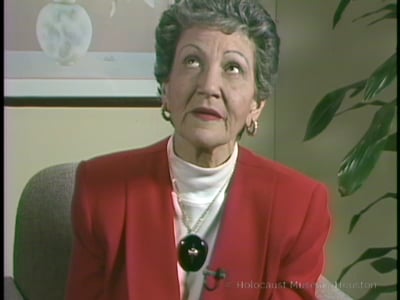“My grandfather chose to remain in Germany. He always did say, ‘Things will get better and I’m staying. Whenever you want to leave, I’m staying.’ And my grandmother on the other side also chose to remain in Germany. And they both perished.”
Ruth’s parents, Leo and Marie Schlamme, raised Ruth and her brother Otto to be proud Germans of the Jewish faith. For the Schlammes, the two identities were not incompatible. They celebrated the Jewish holidays, but were also comfortable socializing with their non-Jewish neighbors in Würzburg, even participating in their Christmas celebrations.
All of that changed when Hitler came to power in 1933. Although the Schlamme household was still filled with laughter and music—Marie was a concert violinist—danger lurked outside their door. Ruth’s and Otto’s friends turned against them and they were forced to leave school. At first, Leo and Marie hesitated to leave Germany. “These people had their home,” explained Otto, “their parents were in Germany, they had lived there all their lives.” Finally, the Schlammes acknowledged that life was untenable in Nazi Germany. Ruth left first, traveling to Rochester, New York under the auspices of the German Jewish Children’s Aid, an American organization that brought children to the United States and placed them with foster families. She arrived in 1936 and settled happily with a young couple and their two children. “I was really worshipped because I was one of the first people to come out,” she commented.
In 1938, Ruth learned that her parents had contacted distant relatives near Houston who agreed to sponsor the rest of the family. Ruth met her parents and her brother in New York and traveled west with them. Naturally, she was thrilled to see them, but she was also sad to leave Rochester where she had made many friends and grown fond of her foster family. Adjusting to life in Houston was difficult for the whole family. Although Marie was fortunate to find a position with the Houston Symphony, Leo, who had headed a wine distribution business in Germany, started near the bottom of the employment ladder at Weiner’s Department Store. “Under no circumstances did our parents want to go back,” said Ruth. “But they missed the life that they had.”
When the United States entered World War II, Otto was “eager to go back” and fight the Germans. He was among the forces that helped liberate the Ohrdruf concentration camp where many of the inmates were so weak and emaciated that it was difficult to tell whether they were dead or alive. At the end of 1945, Otto returned to Houston. He married Steffi Becker the following year and went into the office supply business, eventually opening a company of his own. After Steffi’s death in 1971, Otto married Bettie Westheimer Wisenberg, who died in 1995. Later that year, he married Rosalie Paley Moskovitz, whom he also survived.
Ruth graduated from high school in 1940 and married George Schnitzer. When their first child was born in 1942, Ruth named her Judy in honor of her foster sister in Rochester. She and George also had a son. Ruth’s brother Otto and his wife had two children as well. Both Ruth and Otto were active members of the Houston community. Otto served on the boards of Congregation Emanu El, Taping for the Blind and Holocaust Museum Houston. Ruth’s long list of volunteer affiliations included Lighthouse for the Blind, Seven Acres Geriatric Center and Holocaust Museum Houston. For many years, she sang with synagogue and church choirs in the Houston area.
Parents
Leo Schlamme, survived
Marie Sprinz Schlamme, survived


